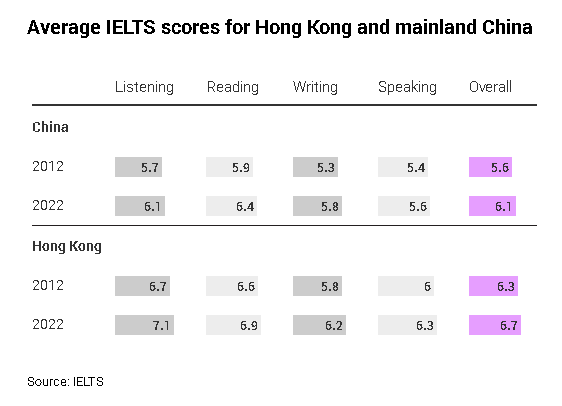Hong Kong News

Mainland Chinese students make greater gains than Hong Kong pupils in English test
Mainland Chinese candidates who sat an internationally recognised English test have made greater improvements in their proficiency of the language than their Hong Kong counterparts over the past decade, according to results analysed by the Post.
But the English level of Hong Kong’s test takers was still better than that of the mainland’s. The mean score for candidates from the city last year stood at 6.7 on a 9-band scale, while those from the mainland received 6.1.
A veteran English teacher, who has taught mainland students, and a human resources expert both attributed the progress to the candidates’ diligence in preparing for the test and China opening up to the world.
 Hong Kong students’ mean score was 6.7, while mainland candidates received 6.1 last year.
Hong Kong students’ mean score was 6.7, while mainland candidates received 6.1 last year.
The IELTS, a standardised test to assess English language proficiency, recently announced the results of last year’s test takers from 39 nationalities who are non-native speakers.
Candidates are rated on a 9-band scale, with 1 indicating a “non-user” of the language, 6 a “competent user” and 9 an “expert user”.
The test comprises four sections – reading, listening, writing and speaking – each of which is graded separately.
Hong Kong candidates’ English proficiency ranked third in Asia last year, behind test takers from Malaysia and the Philippines, according to the latest report. They performed best in listening with a mean score of 7.1.
The results of Singapore candidates were not provided in the latest data set.
Malaysian test takers had an overall mean score of 7, while students from the Philippines received 6.8 and mainlanders got 6.1, ranking 15th in Asia. Mainland candidates performed best in reading.
Candidates from Hong Kong ranked 10th and mainlanders 29th among the nationalities.

In terms of improvement, Hongkongers’ mean score of 6.7 last year marked an increase of 6 per cent over the past decade compared with 6.3 in 2012.
The mean score of mainland candidates jumped 9 per cent from 5.6 in 2012 to 6.1 in 2022, almost narrowing the gap with their Hong Kong counterparts.
Veteran English teacher Pauline Chow Lo-sai, who has taught mainland students, said their progress in learning the language could be attributed to the nation opening up to the world and frequent use of the internet.
Chow added test takers were usually the ones who were preparing to study overseas and trained as “exam machines”.
“Mainlanders are very good at sitting exams and they have a better grasp of grammar and a rich vocabulary when compared with Hong Kong students,” she said.
She added that mainland students’ relatively poor English listening skills could affect their pronunciation, contributing to their lower marks for both those aspects of the test.
Alexa Chow Yee-ping, managing director of recruitment agency ACTS Consulting, which had once set up a branch on the mainland, also said the opening up of China had boosted the younger generation’s English skills.
Chow added many mainland parents had put all of their resources into preparing their only child and sent them overseas to study.
“Thousands of mainlanders have gone overseas to study in the last decade and their English skills surely became better than before,” she said.
The HR consultant said people should not underestimate the potential of mainland candidates by assuming their English was poor. But she added it was normal for mainland test takers to show more progress as their base score was relatively lower.











